To study about various types of Steam Condensers.
Introduction:
Steam Condenser: It is a device or an appliance in which steam condenses and heat released by steam is absorbed by water.
Classification of Condensers
1. Jet condensers
2. Surface condenser
Jet Condensers: The exhaust steam and water come in direct contact with each other and temperature of the condensate is the same as that of cooling water leaving the condenser. The cooling water is usually sprayed into the exhaust steam to cause, rapid condensation.
Surface Condensers: The exhaust steam and water do not come into direct contact. The steam passes over the outer surface of tubes through which a supply of cooling water is maintained.
PARALLEL-FIOW TYPE OF JET CONDENSER:
The exhaust steam and cooling water find their entry at the top of the condenser and then flow downwards and condensate and water are finally collected at the bottom.
Fig. Parallel flow type condenser
COUNTER-FLOW TYPEJET CONDENSER:
The steam and cooling water enter the condenser from opposite directions. Generally, the exhaust steam travels in upward direction and meets the cooling water which flows downwards.
Fig. Low level counter flow type condenser
LOW LEVEL JET CONDENSER (COUNTER-FLOW TYPE JET CONDENSER)
Figure Shows, L, M and N are the perforated trays which break up water into jets. The steam moving upwards comes in contact with water and gets condensed. The condensate and water mixture is sent to the hot well by means of an extraction pump and the air is removed by an air suction pump provided at the top of the condenser.
HIGH LEVEL JET CONDENSER (COUNTER-FLOW TYPE JET CONDENSER)
It is also called barometric condenser. In this type the shell is placed at a height about 10.363 meters above hot well and thus the necessity of providing an extraction pump can be obviated. However provision of own injection pump has to be made if water under pressure is not available.
Fig. High level counter flow type condenser
EJECTOR CONDENSER FLOW TYPE JET CONDENSER
Here the exhaust steam and cooling water mix in hollow truncated cones. Due to this decreased pressure exhaust steam along with associated air is drawn through the truncated cones and finally lead to diverging cone. In the diverging cone, a portion of kinetic energy gets converted into pressure energy which is more than the atmospheric so that condensate consisting of condensed steam, cooling water and air is discharged into the hot well. The exhaust steam inlet is provided with a non-return valve which does not allow the water from hot well to rush back to the engine in case a failure of cooling water supply to condenser.
Fig. Ejector flow type condenser
SURFACE CONDENSERS
DOWN-FLOW TYPE:
The cooling water enters the shell at the lower half section and after traveling through the upper half section comes out through the outlet. The exhaust steam entering shell from the top flows down over the tubes and gets condensed and is finally removed by an extraction pump. Due to the fact that steam flows in a direction right angle to the direction of flow of water, it is also called cross-surface condenser.
CENTRAL FLOW TYPE:
In this type of condenser, the suction pipe of the air extraction pump is located in the centre of the tubes which results in radial flow of the steam. The better contact between the outer surface of the tubes and steam is ensured, due to large passages the pressure drop of steam is reduced.
INVERTED FLOW TYPE:
This type of condenser has the air suction at the top, the steam after entering at the bottom rises up and then again flows down to the bottom of the condenser, by following a path near the outer surface of the condenser. The condensate extraction pump is at the bottom.
REGENERATIVE TYPE:
This type is applied to condensers adopting a regenerative method of heating of the condensate. After leaving the tube nest, the condensate is passed through the entering exhaust steam from the steam engine or turbine thus raising the temperature of the condensate, for use as feed water for the boiler.
EVAPORATIVE TYPE:
The principle of this condenser is that when a limited quantity of water is available, its quantity needed to condense the steam can be reduced by causing the circulating water to evaporate under a small partial pressure.
The exhaust steam enters at the top through gilled pipes. The water pump sprays water on the pipes and descending water condenses the steam. The water which is not evaporated falls into the open tank (cooling pond) under the condenser from which it can be drawn by circulating water pump and used over again. The evaporative condenser is placed in open air and finds its application in small size plants.

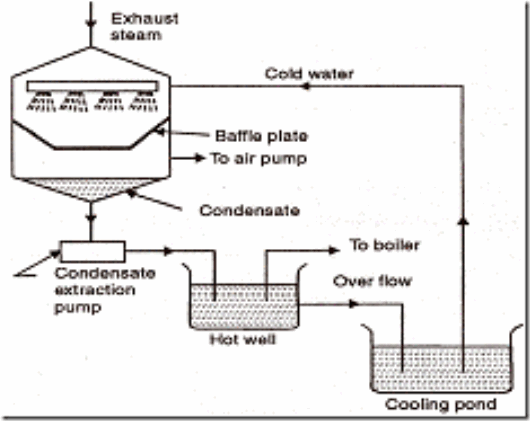
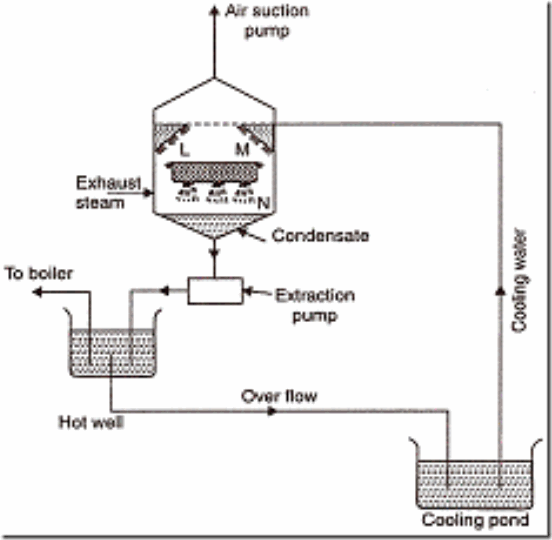
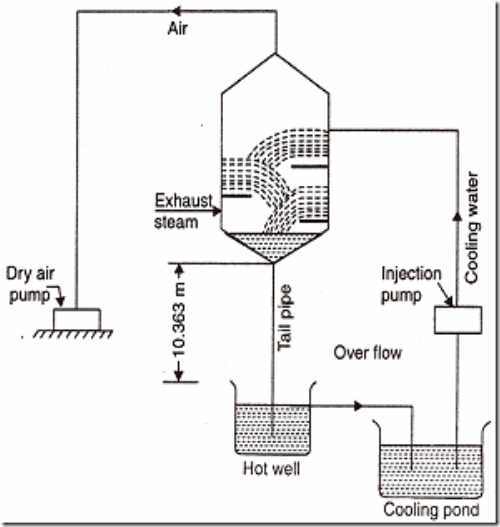
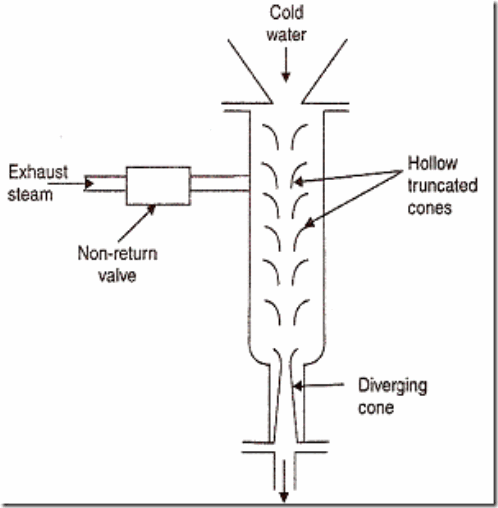
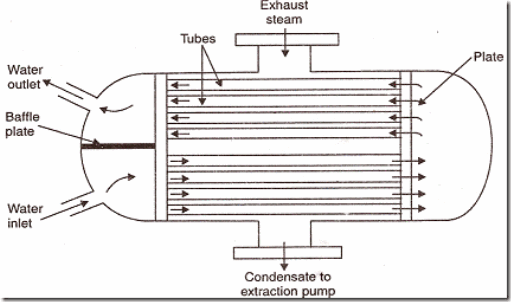
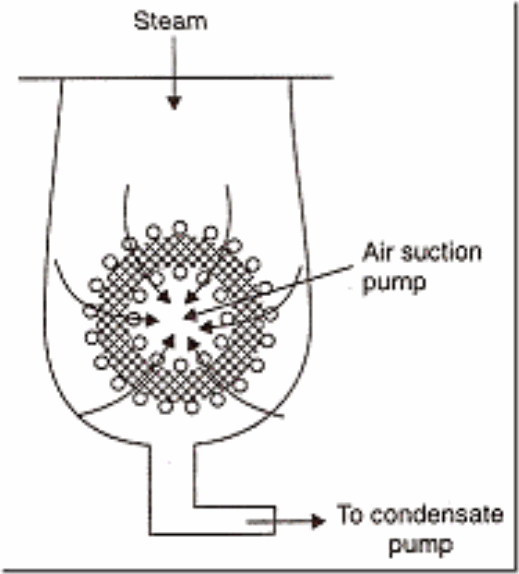
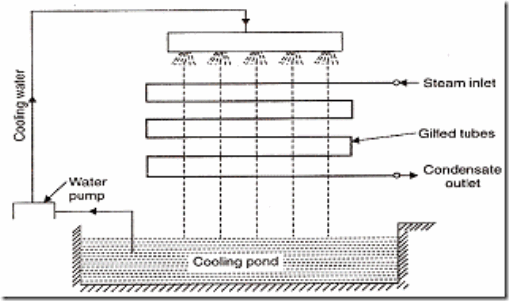
12 Responses to “Lab Manual | To study about various types of Steam Condensers.”
kanika
can i plz get notes for window room air conditioner experiment…
kanika
the aim of the experiment which i want material for is::TO STUDY THE FUNCTIONING OF WINDOW ROOM AIR CONDITIONER..TY..REGARDS
admin
Follow the link
https://engineering.myindialist.com/2009/lab-manual-to-determine-cop-and-tonnage-capacity-of-a-air-conditioning-system/
I think this would resolve your query, If it does not resolve your purpose, please let us know.
kanika
sir,
thank u for considering my comment…i am a first yr btech student 4m mdu…n r subject is basics of mechanical so in this practical we just have to explain the basic parts and the functioning of an window air conditioners alond with its diagrams,,so d material provided helps a little bt more of it woukd be needed..ty..regards
kanika
plz plz plz m in need of d material coz i cant find it anywhere on net or plz tell me some gud books of mechanics where i can find more about window air conditioner along with the flow charts n diagrams
Anil
@kanika
refer refrigeration and airconditioning book..
parmendar singh
thanks solvin my probleame…………….
muzammal usman
sir if u send me details of codenser or types and evaporator with various types used in industries at my e mail address i shall be verythank to U sir plzzzzzzzzzzz
dishit bhatt
I wont the ppt on clssification of condenser .It is very helful to me. So plz send it on my mail id
Eng.D.L.Kumudu
Very good set of notes. I really appreciate your contribution.
admin
Thanks for the appreciation. Stay tuned.. We are in process of contributing more tutorials.
Alok
Thank you sir